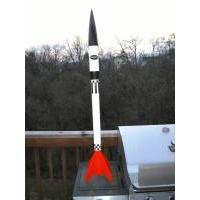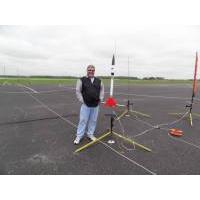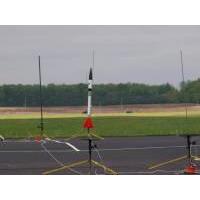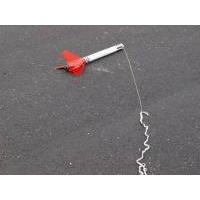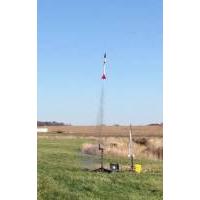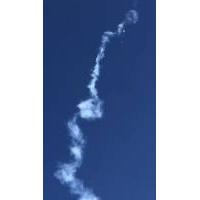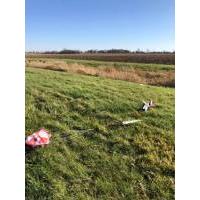| Construction Rating: | starstarstarstarstar |
| Flight Rating: | starstarstarstarstar_border |
| Overall Rating: | starstarstarstarstar_border |
| Published: | 2020-11-12 |
| Diameter: | 2.50 inches |
| Length: | 46.25 inches |
| Manufacturer: | Estes  |
| Skill Level: | 5 |
| Style: | Sport |
 Brief
Brief
The Ventris is one of the first four rockets released by Estes as part of their new Pro Series II mid-power collection. While all are great looking birds, the Enerjet-esque lines of the Ventris were the clincher when it came time to make the choice of which bird would be my 50th birthday present.
Components
- Plastic nose cone
- Payload section
- Main body tube
- Plastic transition section
- 4 plywood TTW fins
- 29mm motor mount
- 29mm motor retainer
Construction
I'm not an epoxy fan. That said, I felt like this was something I had to do if I was truly going to make a go for a level 1 certification in 2013.
Finishing
The stock finish for the Ventris is a white, black and red scheme with a couple of decals that don't exist. Red, white and black is one of my favorite combinations, so I stuck with it when the time came to paint. This was a fairly large rocket, and the whole thing got a coat of thinned Elmer's Carpenter's Wood Filler to help eliminate the tube spirals and smooth out the wood grain. Sanding commenced, followed by a second coat of the thinned wood filler and more sanding. After two rounds of sanding I decided that I was not going to go for a third and hosed the thing down with Valspar primer. After more sanding, more priming, and more sanding, I have to admit that I was impressed with the fairly flawless look to the pre-paint finish.
I once again hosed the entire rocket down with Valspar gloss white, then sprayed the fin can with my almost trademark Testors Racing Orange, but I didn't care for the way it covered. Too thin in one spot, too thick in the other, it was what my brother in law called an ID10T error. Clearly my painting skills were not as easily adapted to big rockets. I sanded off the offending Racing Orange and resprayed the fin can with Testors Bright Red Gloss. It was immediately evident that the choice was a correct one, and I forged ahead with the project. The nose cone and transition were sprayed with Testors Black Metallic, and when dry-fitted I began to see the finished product as more of a throwback look. I got a vintage Estes logo from Kurt's Decal Page and upscaled it so that it didn't look lost on the white payload tube.
While the vintage logo looked cool, it also looked lonely, and I wanted to do a wrap decal anyway to mimic the package look. (I'm of the opinion that they should have been included, but what do I know?) Several years ago I bought a set of decals from Thrustline Aerospace. There were three sheets with wraps sized for BT-20, BT-50 and BT-55 sized rockets, and I happened to scan all three sheets when I got them. With that done it was a simple exercise to pick out the wraps I liked and upscale them to fit the Ventris tube. Got it on the first try!
Flight
The Ve

ntris required a field bigger than B6-4 Field, and by the time I finished the build, flying season was over at the TORC cornfield. I was thinking that I might have to wait until NARAM to be able to launch it, but then another factor entered into the equation. I'd dutifully kept a log of all my flights since 1977 over the years, early on in a savings & loan notebook and in later years using the Flight Log feature at EMRR. As close as I could figure it, I was approaching 1000 flights over my 36 years. I think I was within 17 when I made the discovery, and I probably should have just kept flying at B6-4 Field and dusted off my Beta clone for the 1000th flight, but I decided that I wanted to do it big.
Boy, did I do it big.
When the final launch at the cornfield was rained out, I started looking around for other fields within a decent drive. Turned out that ROCI had a flight weekend at AMA Field in Muncie, a 2.5 hour drive for me, but also a field I'd flown at previously and had been very much impressed with. Weather permitting, I decided that I'd make the drive and make my 1000th flight with the finished Ventris.
Launch day arrived wet, cold and windy. I had an internal struggle over whether or not to fly, and launch fever won. Much of the 2.5 hour drive was done in conditions ranging from a nasty mist to a steady drizzle, and I was close to just following my GPS on a photography tour of east central Indiana. I stopped at a McDonalds for an iced tea and my leg hair froze when I stepped out in my shorts. Luckily I had brought a pair of jeans, and I found a deserted spot in the shopping plaza next to the McD's and changed, luckily without anyone figuring out what I was doing.
Things at the field started poorly. REALLY poorly. The first flight of the day, and #996 in my flight career, was the first flight of my just completed Estes Rascal upscale. An E9-4 CATO absolutely killed the rocket. Two flights later an E9-8 CATO killed flight #999, my FSI Dart clone. Confidence? We don't need no steenking confidence. I never wavered. I was sure flight #1000 would be one for the books. I loaded the Ventris with an F50-6T, one of the motors listed on the package, bought on the same day as the rocket. MY BIRTHDAY. What could go wrong with all this good mojo flowing? I was so confident of a successful flight that I allowed myself to be photographed with the Ventris. I HATE having my picture taken. Yeah, this was going to be big.
Everything looked normal at first. The Ventris left the pad with authority, and for a moment I was very impressed with the new Estes motors. The motor stopped burning with the rocket still heading rapidly upward, and I began counting off the delay. 1. 2. At 2 things happened fast. The ejection charge fired and everything tried to come to a halt in the air. Not happening. The chute filled, allowing the lower section of the rocket to scream past, then attempt a violent turnabout. The parachute reappeared, looking normal as it drifted with the wind, nose cone and payload section firmly attached. The lower section did a spinning free fall toward the ground, trailing the shock cord. I did a quick check of the angles and realized that the unfortunate tumble recovery was going to bring it in dead in the middle of the asphalt that it had launched from. I might have been able to salvage something if it had hit in the grass, but it wasn't that kind of day. The lower body landed flat and violently on its side, bouncing about three feet in the air. One fin took the brunt of the impact, which not only tore the epoxy fillets loose, but also shredded one edge of the fin and left it with small rocks embedded in it.
The good news was that Estes more than made up for the carnage. I reported the two explosions that happened on new motors, the Rascal and the Ventris. Estes sent a package of E9-4s and an F50-6T in place of the F50-2T that killed the Ventris, along with a replacement Ventris.




Finding the interest in getting the Ventris back on the flightline wasn't difficult, but finding a day when I could fly it and not lose it was another thing entirely. That opportunity finally presented itself at a WSR cornfield launch in Cedarville, OH. A seventy degree day with light winds is not one to be wasted, so the Ventris made the traveling team for the umpteenth time. The difference was, this time it would actually fly. It was flight #3 in a seven flight day on the road to 200 flights on the year. (The only reason I didn't make the 200th flight with it is because it didn't fare well on flight #1000.) Flying from the mid-power pads is a fairly new experience for me, and I made sure I got all the detail boxes checked. The Ventris was loaded on pad next to an NCR Archer, and they'd go back to back in the flight sequence. Loaded with the F50-6T that Estes had sent to replace the F50-2T several years back, the Ventris left the pad quickly, with a gentle lean to the right in the breeze. It crossed the creek to the adjacent cornfield and topped out around 1100'. Ejection came just as it tipped over and it began a gently swinging trip back toward the high power pads. As it crossed the creek, the Archer took off, and passed close enough to the Ventris that it undoubtedly felt the breeze. The Ventris carried on toward earth and at the last second swung to the left and touched down. The nose cone and parachute followed to complete the textbook recovery. Then the Archer came in and hit the Ventris from the top rope with a piledriver, landing hard right on the body tube. Neither rocket was damaged in the melee.
Recovery
Summary
Pros: Great classic design and satisfying bulk. Seriously sharp bird.
Cons: Only a generic Estes decal? Would it have killed you to include a wrap. 2013? Hey, that was seven years ago. Still no level one.
Other Reviews
- Estes Ventris By Bas Dickson Leach (September 27, 2013)
Part of the Pro Series II line of 29mm mid power kits, the Ventris is a payloader with a larger diameter paylod bay and stylish curved fins. I liked the look of it and found the enlarged payload bay interesting and wanted to build one, received as a birthday present and waited less than a fortnight to get cracking. Components The Pro Series II kits are all bagged. It had stood ...
 |
 |
Flights
Sponsored Ads
 |
 |
